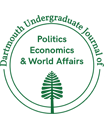Abstract
The word “corruption” has two separate but interrelated meanings. The first kind of corruption refers specifically to an abuse of public office for private gain; the second is broader and indicates a disjunction between a political reality and the ideal to which that reality ought to conform. This paper explores the role of various forms of “corruption talk” in the 2020 presidential election. The first part of the paper examines the “supply side,” looking at the kinds of “corruption narratives” that politicians offered in 2020. Using natural language processing, I analyze how Joe Biden, Donald Trump, and Bernie Sanders spoke about corruption. I show that while Biden tended to speak about corruption in a manner familiar to political scientists — as an abuse of public office for private gain – Sanders and Trump used “corruption” in a completely different way, referring to it as a quality of social groups, corporate interests, “foreign” values, or even the “system” as such. I then examine the “demand side,” using data from the American National Election Survey (ANES) to demonstrate how various forms of “corruption talk” may have played a role in voting outcomes. Finally, I situate the rise of the anti-establishment appeal in the context of the neoliberal turn and propose that the most powerful tool to fight right-wing populism is a discourse that acknowledges the “corruption” of the status-quo and appeals to the principle of popular sovereignty, thereby providing a liberal and inclusive alternative to populism.
Recommended Citation
Loewer, Milan
(2022)
"“Pure People” and “Corrupt Elites:” Corruption Talk in the 2020 Election,"
Dartmouth Undergraduate Journal of Politics, Economics and World Affairs: Vol. 1:
Iss.
4, Article 2.
Available at:
https://digitalcommons.dartmouth.edu/dujpew/vol1/iss4/2
Included in
Economics Commons, Education Commons, Geography Commons, Law Commons, Legal Studies Commons, Medicine and Health Sciences Commons, Political Science Commons, Public Affairs, Public Policy and Public Administration Commons


